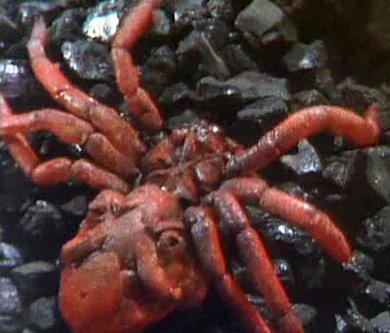Garoga Spider
| |||||||||||||||||||||||||||||||||||||||||||||||||||||||||||
The Garoga Spider (ガロガスパイダー Garoga Supaidā) is a spider kaiju created by Toho that appears in the ninth episode of Zone Fighter, "Find the Secret of the Red Spider!".
Name
The Garoga Spider's Japanese name, Garoga Supaidā (ガロガスパイダー), is simply a combination of Garoga (ガロガ), the name of the race who deployed it, and supaidā (スパイダー), the Japanese word for spider. The creature is also sometimes referred to as the Red Spider (赤いクモ or レッドスパイダー), including the name of its debut episode, "Find the Secret of the Red Spider!" Additionally, the book Toho Special Effects All Monster Encyclopedia erroneously refers to the Garoga Spider as Garopa Spider (ガロパスパイダー), albeit only once.[1]
Design
The Garoga Spider is a giant crimson spider, with some black highlights.
History
- Zone Fighter (TV 1973) [episode 9]
Showa era
Zone Fighter
"Find the Secret of the Red Spider!"
The Garoga Spider was deployed by the Garogas to mutate animals into Terror-Beasts. It was initially sent after a truck carrying two lions, with the intention of turning them into pawns for the Garoga. It was thwarted from turning the lions and instead traveled to a zoo. After encountering an escaped gorilla, the spider promptly bit into the primate. The Garoga Spider then began drinking the blood of the gorilla, transforming it into Garoga Gorilla. The Garoga Spider then flew away in a hurry and ended up landing on a pair of railroad tracks, before being killed by an oncoming train, ending the brief chaos it created.
Abilities
Flight
The Garoga Spider is able to fly at a moderate speed, allowing it to locate and descend on its prey. It used its flight to pursue a truck containing two lions, intending to mutate them before being forced to retreat. Later, it chased after an escaped gorilla in order to successfully mutate it.
Blood-sucking
The Garoga Spider is able to drink the blood of its victim through a bite, which causes the victim to undergo rapid growth and mutation. It demonstrated this on a zoo gorilla by sticking a stinger into it, turning it into the Garoga Gorilla.
Weaknesses
The Garoga Spider is not a very durable kaiju, as it was immediately killed after being struck by a train after landing on train tracks.
Gallery
- Main article: Garoga Spider/Gallery.
References
This is a list of references for Garoga Spider. These citations are used to identify the reliable sources on which this article is based. These references appear inside articles in the form of superscript numbers, which look like this: [1]
|
Comments
Showing 8 comments. When commenting, please remain respectful of other users, stay on topic, and avoid role-playing and excessive punctuation. Comments which violate these guidelines may be removed by administrators.
